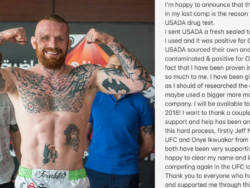The trouble with Ostarine: Jimmy Wallhead’s
16th March 2018
Features


The Belarusian athletics federation (BFLA) has appointed Ivan Tsikhan (Иван Тихон) as its new President, after he was proposed by former BLFA President Vadim Devyatovskiy (Вадим Девятовский). Both Tsikhan and Devyatovskiy are hammer throwers, and both have been sanctioned for doping.
Devyatovskiy was sent home from the Sydney 2000 Olympics after a positive test for nandrolone, and it is understood he served a two year ban. In May 2012, Tsikhan was stripped of his Athens 2004 Olympics Silver Medal, after reanalysis of his sample returned an AAF for a prohibited substance. He was withdrawn from the London 2012 Olympics and sanctioned by World Athletics in 2014.
Devyatovskiy told media he had resigned for health reasons, shortly after commenting ‘Lukashenko is not my President!!!!!’ on Facebook (the post has since been deleted) following the re-election of Alexander Lukashenko (Алякса́ндр Лукашэ́нка). Lukashenko is also President of the Belarus Olympic Committee (NOC).
Devyatovskiy and Tsikhan also returned adverse analytical findings (AAFs) for abnormal testosterone levels at the Beijing 2008 Olympics. The Court of Arbitration for Sport (CAS) upheld their appeals against sanctions issued by the International Olympic Committee (IOC) in a lengthy Decision (PDF below), ruling that there were technical faults regarding sample analysis.
‘The Panel wishes to emphasize that its decision should not be interpreted as an exoneration of the Athletes’, reads the above Decision. ‘The Panel is not declaring that the Appellants did not, prior to the competition, administer exogenous testosterone. The Panel is merely concluding that the Respondent has not been able to prove, to the comfortable satisfaction of the Panel, diligent adherence to the rules set out in the International Standard for Laboratories and the relevant Technical Documents.’
Devyatovskiy was involved in another doping case. In 2012, World Athletics reanalysed Devyatovskiy’s sample from the Helsinki 2005 World Championships, and charged him with a doping offence. In 2014, he was exonerated by a World Athletics Disciplinary Panel, but the World Anti-Doping Agency (WADA) appealed, seeking an eight year ban. In a January 2016 unpublished Decision (CAS 2015/A/3977), WADA’s appeal was dismissed, as the CAS Panel was not ‘comfortably satisfied’ that WADA had established the commission of an anti-doping rule violation (ADRV).
• Eleven athletes (and a horse trainer) from eleven countries, competing in nine sports, were...
• 20 athletes from nine countries, competing in ten sports, were involved in anti-doping proceedings...
• Twenty four athletes from 13 countries, competing in eight sports, were involved in anti-doping...